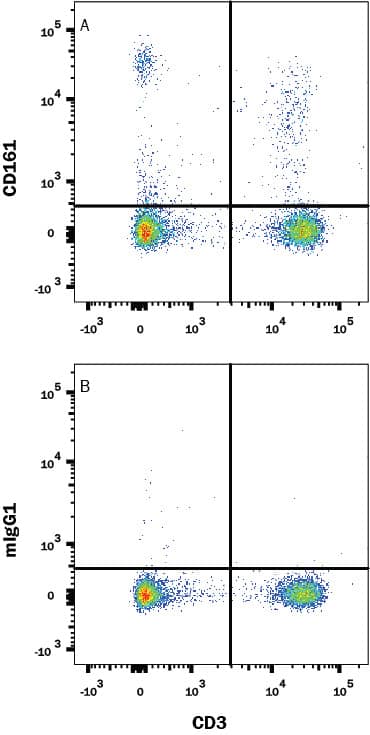Rat CD161 Biotinylated Antibody
R&D Systems, part of Bio-Techne | Catalog # FAB9766B


Conjugate
Catalog #
Key Product Details
Species Reactivity
Rat
Applications
Flow Cytometry
Label
Biotin
Antibody Source
Monoclonal Mouse IgG1 Clone # 10/78
Product Specifications
Immunogen
Purified splenic NK cells from the LEW rat strain
Specificity
Detects rat CD161 in ELISAs.
Clonality
Monoclonal
Host
Mouse
Isotype
IgG1
Scientific Data Images for Rat CD161 Biotinylated Antibody
Detection of Rat CD161 in Rat splenocytes by Flow Cytometry.
Rat splenocytes were stained with Anti-Rat CD3 APC-conjugated Monoclonal Antibody and either (A) Mouse Anti-Rat CD161 Biotinylated Monoclonal Antibody (Catalog # FAB9766B) or (B) Mouse IgG1 Biotinylated Isotype control (Catalog # IC002B)followed by Phycoerythrin-conjugated Streptavidin (Catalog # F0040). View our protocol for Staining Membrane-associated Proteins.Applications for Rat CD161 Biotinylated Antibody
Application
Recommended Usage
Flow Cytometry
10 µL/106 cells
Sample: Rat splenocytes
Sample: Rat splenocytes
Formulation, Preparation, and Storage
Purification
Protein A or G purified from hybridoma culture supernatant
Formulation
Supplied in a saline solution containing BSA and Sodium Azide.
Shipping
The product is shipped with polar packs. Upon receipt, store it immediately at the temperature recommended below.
Stability & Storage
Do not freeze.
- 12 months from date of receipt, 2 to 8 °C as supplied.
Background: CD161
Alternate Names
CD161, CLEC5B, KLRB1, Ly59, NKR, NKRP1, NKRP1A
Gene Symbol
KLRB1
Additional CD161 Products
Product Documents for Rat CD161 Biotinylated Antibody
Product Specific Notices for Rat CD161 Biotinylated Antibody
For research use only
